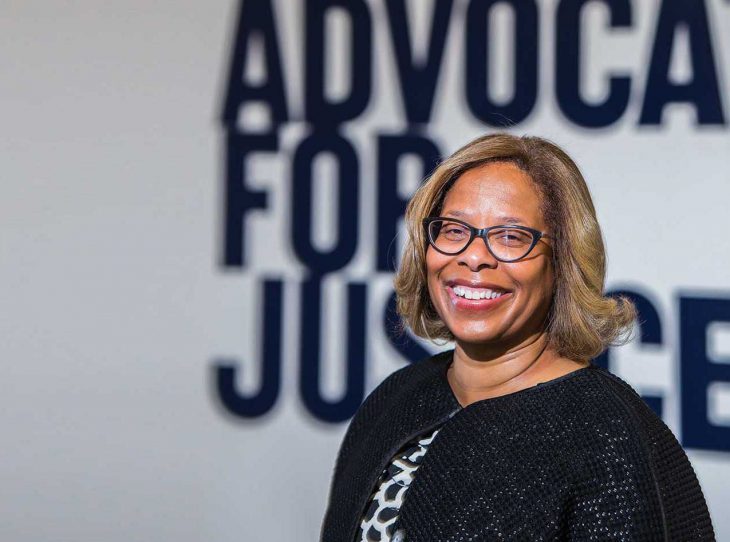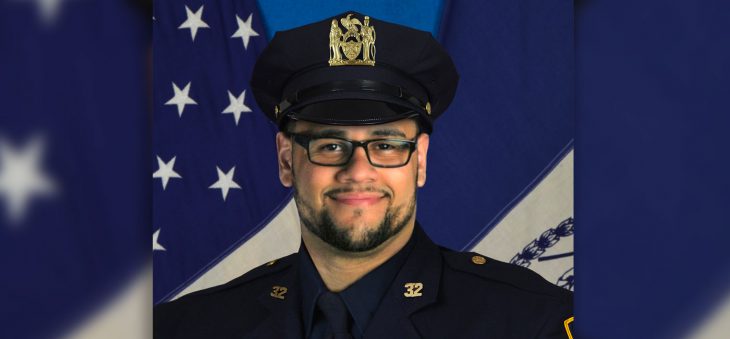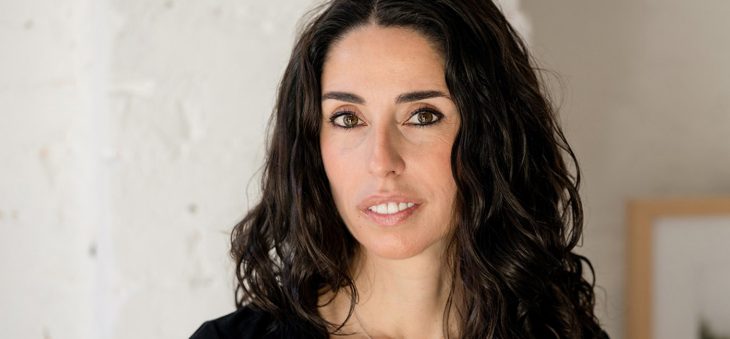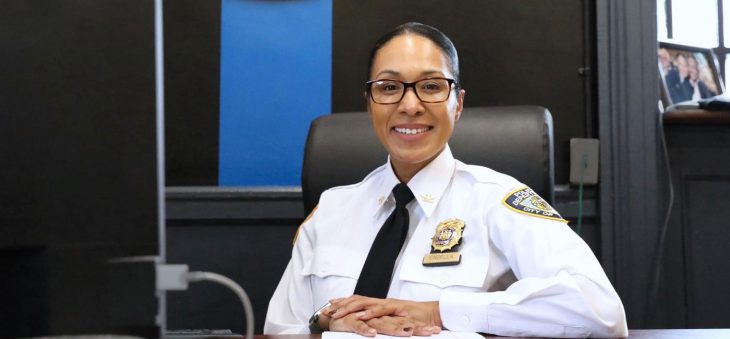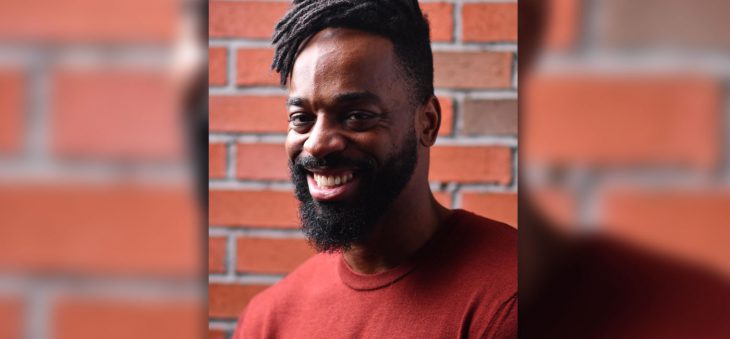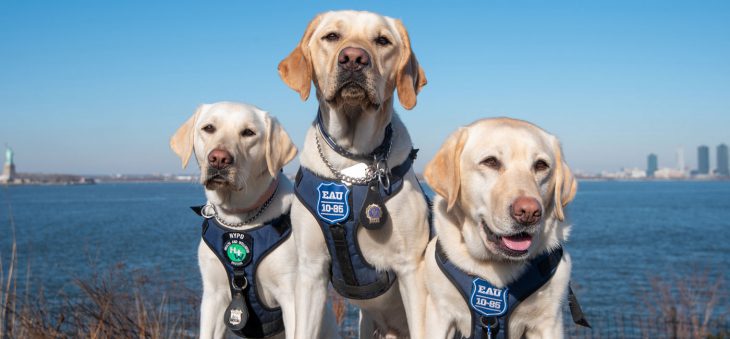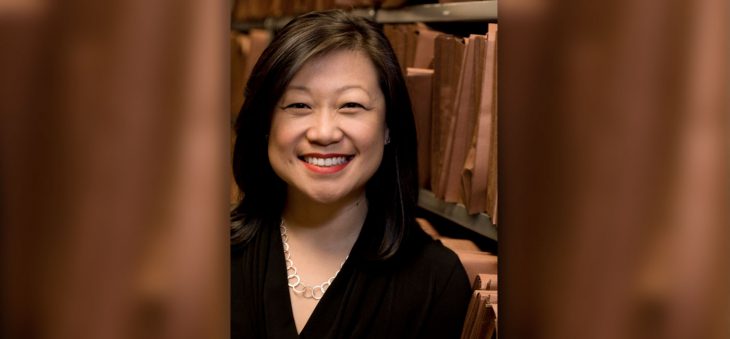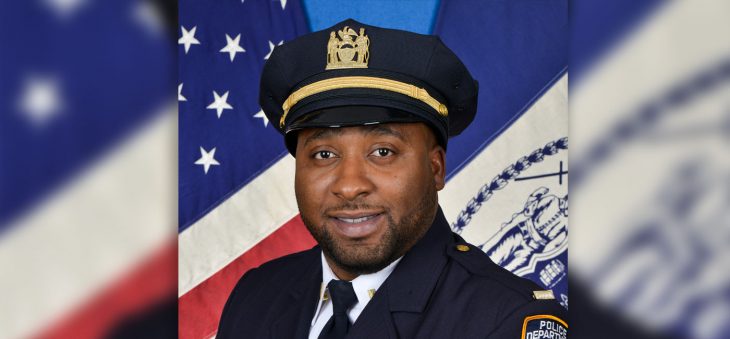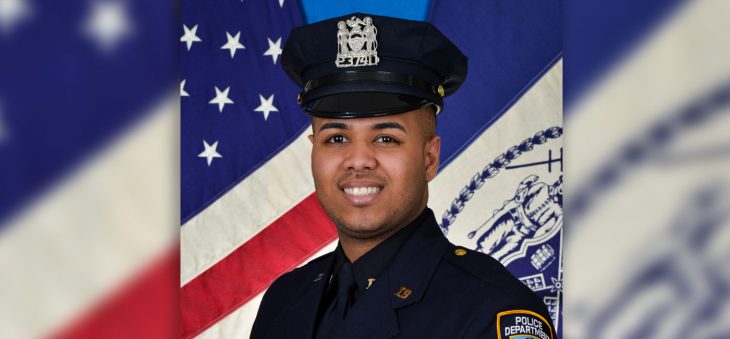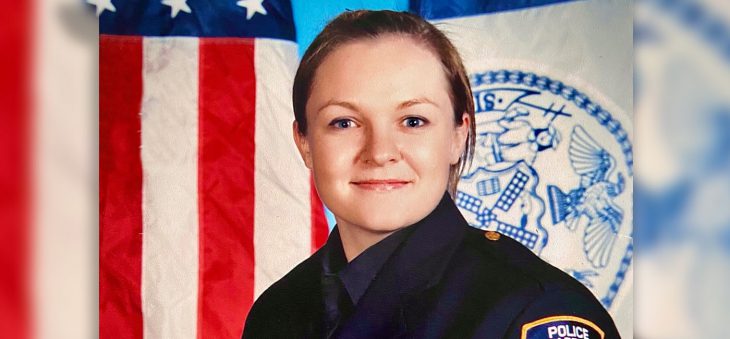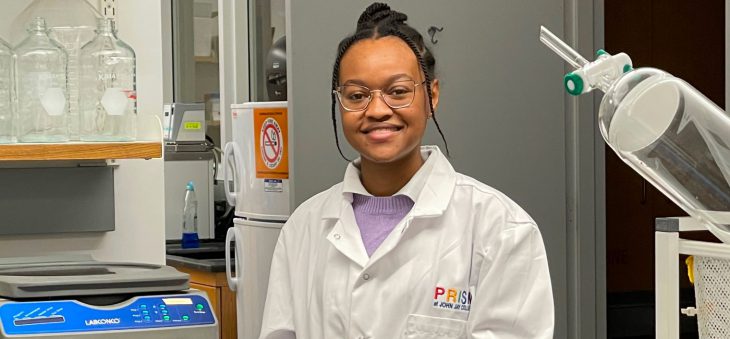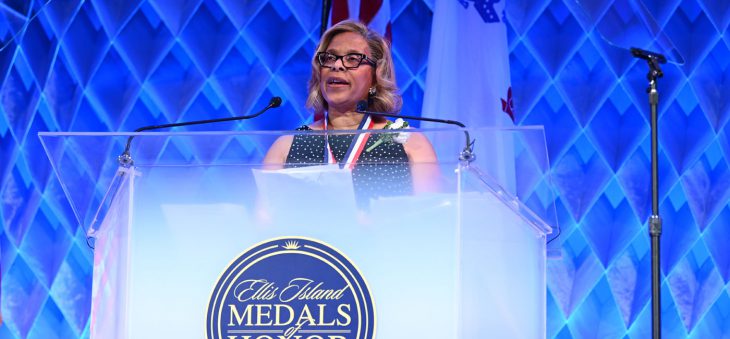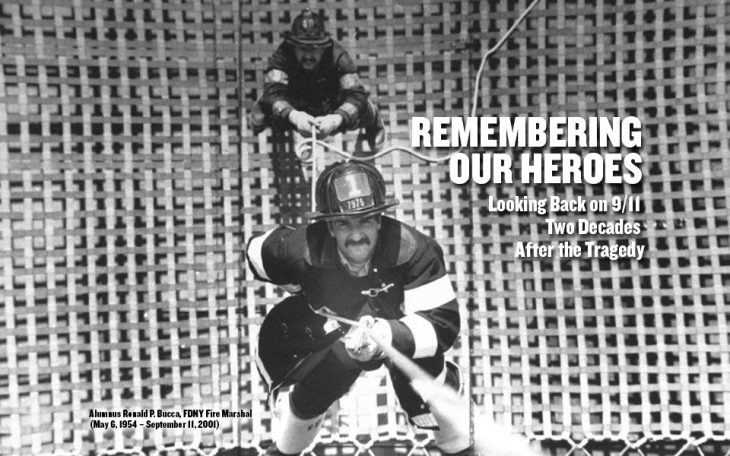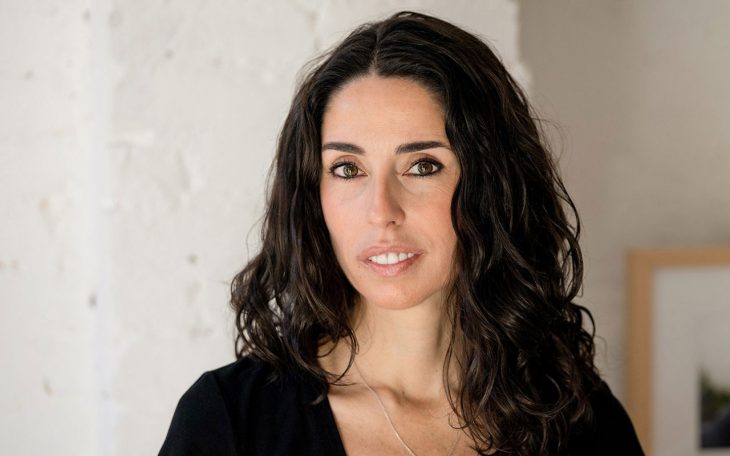Despite the hardships and health risks, John Jay students, alumni, faculty, and staff continue to keep our communities safe throughout the Covid-19 pandemic.
By Andrea Dawn Clark
WHEN COVID-19 FIRST HIT THE UNITED STATES, New York City became the epicenter of a global health crisis. As a New York City-based institution that educates students committed to public service, our community—alumni, students, faculty, and staff—faced the risks and challenges of keeping others safe as we fought to “flatten the curve.” Their service, expertise, research, and unflappable spirit serve as a testament to a John Jay education. We’re still battling this horrific disease, but as we continue the fight, we’d like to recognize and thank all of our front-line heroes.
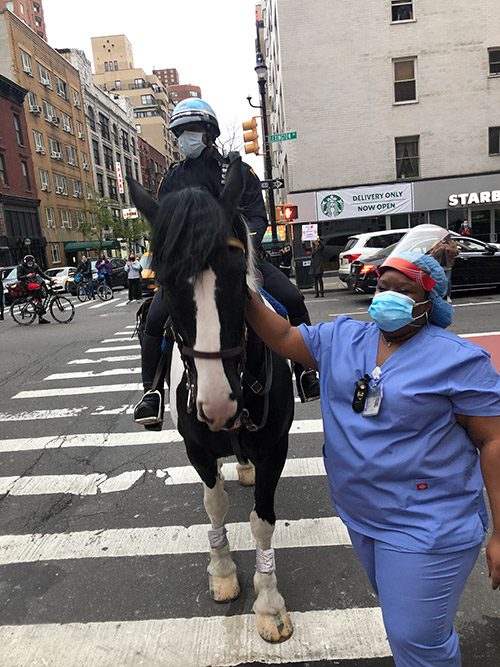 KACIA WILSON ’19
KACIA WILSON ’19
Support Service Associate at Lenox Hill Hospital
Kacia Wilson ’19 works as a Support Service Associate at Lenox Hill Hospital in Manhattan, New York. The John Jay alumna is studying full time at New York Law School, while she puts in long shifts at Lenox Hill, checking medical supplies and transporting patients. Both Wilson’s mother and sister work at the hospital, which heightens the stress levels within her family. “One day I was on the phone with my mom while she was working in a Covid-19 unit. She just broke down saying, ‘Oh my god, a 23-year-old just died. I can’t take it.’ I could hear her crying and I knew why it hit her so hard; I was turning 23,” Wilson recalls. “Just because we’re young doesn’t mean we won’t get this virus.” One shining light in Wilson’s day is seeing patients going home. “We’ve started playing the song ‘Here Comes the Sun’ every time someone gets discharged,” says Wilson, noting that in May they discharged their 1,000th Covid-19 patient. “I know we can get through this, especially with a team like ours. One thing is for sure, New Yorkers don’t quit.”
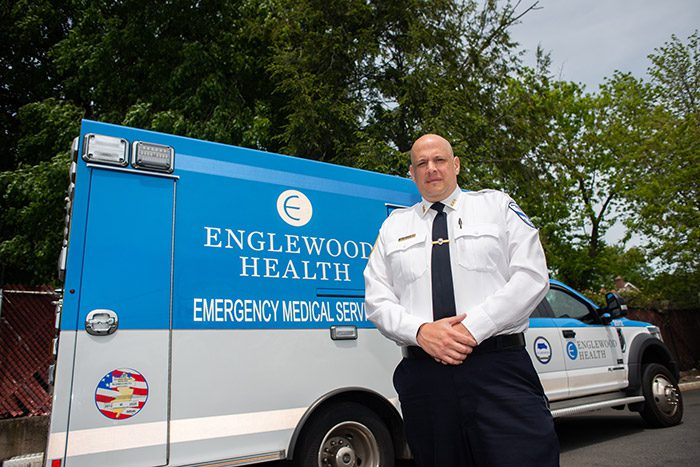
RICHARD SPOSA ’01
Adjunct Professor, Security, Fire and Emergency Management and Director of Englewood Health’s Emergency Medical Services
In the race to flatten the curve, EMS (emergency medical services) professionals such as John Jay alumnus and Adjunct Professor Richard Sposa ’01 worked around the clock to acquire life-saving equipment for hospitals. Working in Bergen County, New Jersey, one of the hardest-hit counties in the state, Sposa, Director of Englewood Health’s Emergency Medical Services, runs the hospital command center. At the height of the crisis every day was a scramble. “It was a non-stop race trying to meet the needs of our staff, ensuring they had enough PPE (personal protective equipment), and trying to meet the needs of our patients,” says Sposa, a seasoned EMS professional with operational stress management training. “I’ve responded to incidents following plane crashes, train crashes, fires, hurricane floods, and even 9/11, but I’ve never faced an incident such as Covid-19. In all those other instances I was responding to an incident. I wasn’t in the plane or train that crashed. I wasn’t in the towers on 9/11. With Covid-19, you can’t see it, but you’re immersed in it. You could be responding to an incident, working on a patient, and be sick and not even know it. You could bring it home to your family. And, you don’t know when this crisis is going to end.”
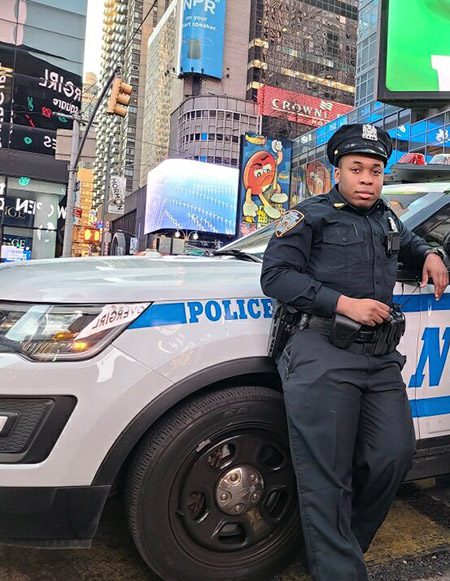
SHANE WORRELL-LOUIS ’19
NYPD Officer
Shane Worrell-Louis ’19, a New York City Police Department (NYPD) Officer from Brooklyn, New York, takes his response to the Covid-19 health crisis day-by-day. “A typical day for me is making sure that businesses that are open follow the guidelines we’ve received, and that the businesses that are closed stay secure,” says Worrell-Louis. “I also provide wellness checks and engage with the public to ensure that everyone is safe during this tough time. I try to both enforce and promote social distancing.” Some of the hardest moments Worrell-Louis has had to face involve seeing people in crisis battling health problems, contending with emotional distress, and experiencing financial struggles—especially within the homeless population. “The homeless population has nowhere to turn and nowhere to feel protected from the virus. When tragedy hits a nation, it’s always the poorest and most vulnerable among us that seem to take the hardest hit,” says Worrell-Louis. “A moment that will always stay with me is when I observed a young adolescent come out of a Wendy’s and donate his meal to a homeless person. That’s what being a New Yorker is all about, getting the job done, and helping others in need.”
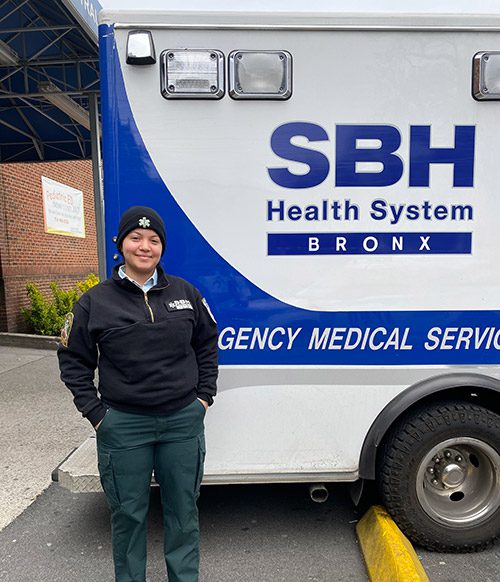
ROSA JIMENEZ ’20
EMT
As an EMT (emergency medical technician), Rosa Jimenez ’20, was working on the front lines of the Covid-19 crisis while she studied to finish earning her degree at John Jay. Her job is focused in the Bronx, New York City’s hardest hit borough. “The minute I get to work, I punch in and rush back to the bus—that’s what we call the ambulance—to clean and disinfect it,” says Jimenez. At the beginning of the pandemic, Jimenez and her team didn’t have any disinfectant wipes. “So, I’d have to cut up a blanket or sheet and make my own wipes from the cut-up pieces and a disinfectant solution.” After earning her degree, Jimenez has set her sights on becoming a physician assistant, in no small part due to the selfless work she’s witnessed from all the medical professionals around her. “Every day I’m out in the field, I get to see firsthand how hard our health care professionals are working to save lives. They’re working together to come through on the other side of this pandemic, and that’s really inspiring for me.”
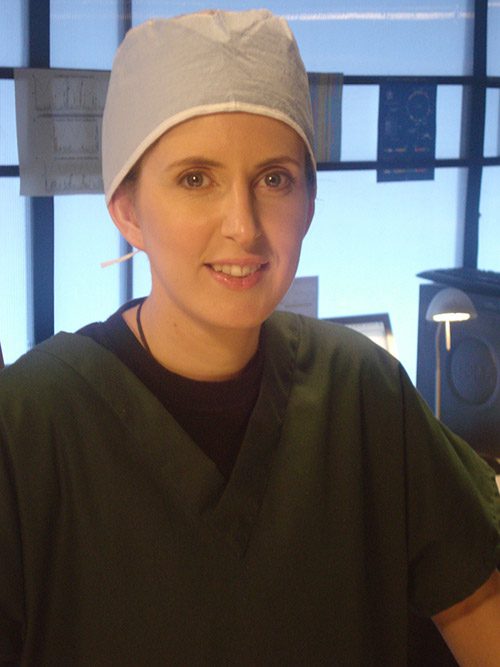
ANGELIQUE CORTHALS, PH.D.
Associate Professor, Sciences
One of the front lines that can often be overlooked is the scientific front line. Doctors and scientists like Angelique Corthals, Ph.D., Associate Professor in the Department of Sciences, are working around the clock to find a way to prevent the disease from spreading and produce a viable vaccine. Corthals, a forensic anthropologist and biomedical researcher, is conducting two rapid-response projects funded by the National Science Foundation (NSF) specifically related to Covid-19 research. “What I’m interested in is not only the origin of the disease and the process of how it evolved, but also how we can stop the spread and prevent the next pandemic,” she explains. In the first project, Corthals and her colleagues from Stony Brook University and Texas Tech University are examining how bats with SARS-CoV-2, the virus that causes Covid-19, can be infected but not affected by the virus. “The hope is that through the research, we’ll figure out what proteins in the immune system can be targeted and used for immunization.”
In her second NSF-funded collaborative project, mucin-producing “goblet cells” are the focus (mucins are the major macromolecular components of mucus). “If we go through all the Covid-19 symptoms, and we look at the sites in the human body that Covid-19 affects, the one commonality is the goblet cells,” says Corthals, discussing the research she’s conducting with team members from Yale University and Stony Brook University. “Could it be that upon entry of the virus, goblet cells in bats contain the virus and then dissolve it? Or is it that bats have fewer goblet cells in their upper respiratory tract, making them less susceptible to being invaded by the virus?” She hopes that this research will better inform the scientific community about treatments and immunizations, while also enabling the surveillance of bat populations, to prevent the next pandemic.
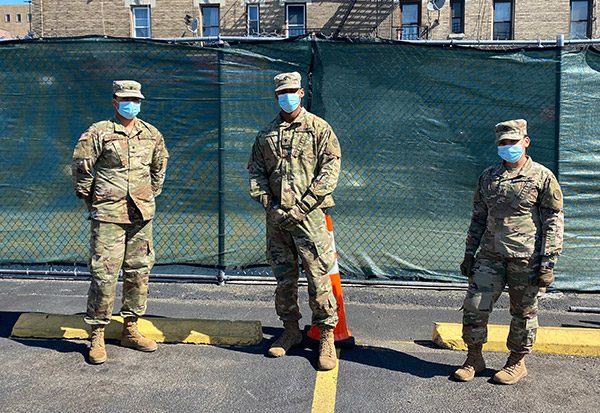
MATTHEW HART ’20
New York National Guard Specialist
New York National Guard Specialist Matthew Hart ’20 has a lot on his plate. This past summer, he typically got up at 4:30 in the morning and juggled six classes at John Jay along with his work schedule, which allowed him to graduate on time. His main jobs with the National Guard are directing traffic at Covid-19 testing sites and helping organize food distribution centers for people in need. At the Covid-19 testing sites, Hart is often assigned the duty of taking patient information through car windows, but he’s assigned himself another task: morale booster. “People come through the testing site and they’re extremely scared. They drive up in their cars, and as instructed, they keep their windows up when they get to my checkpoint,” says Hart. “I’ve almost lost my voice some days because I have to speak really loud to check them in through the glass. After each person drives away from a Covid-19 testing site, I give them a thumbs up. I know that they’re nervous about the results and I want to encourage them to stay positive.”
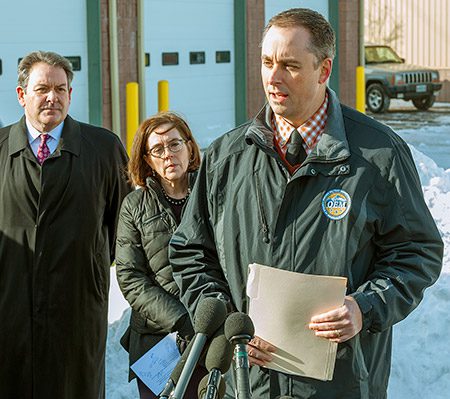
ANDREW PHELPS ’08
Director, Oregon Office of Emergency Management
As the Director of Oregon’s Office of Emergency Management, Andrew Phelps ’08 leads statewide efforts to prepare for, mitigate against, respond to, and recover from emergencies and disasters, regardless of the cause. With an extensive background in emergency management, the hardest part of the pandemic for Phelps is knowing that no matter how hard he works, or how well he does his job, people are still going to die from this virus. But being able to use his knowledge to save as many lives as possible, keeps him going. “It was an amazing experience when I was called by our Governor about the idea of sending our allocation of ventilators from the Strategic National Stockpile to New York,” says Phelps, who was inspired to study emergency management after feeling helpless during 9/11. “As an emergency manager, it’s never easy to give up a resource you may need to help save lives in your community, but ultimately, we decided things sitting on a shelf in Oregon could save a life across the country within 24 hours. That thought made the decision an easy one to make. Being able to call my counterpart in New York and make that happen has been one of the most rewarding parts of this experience, not just because it was the right thing to do, but because I was able to help my old stomping grounds a bit.”

